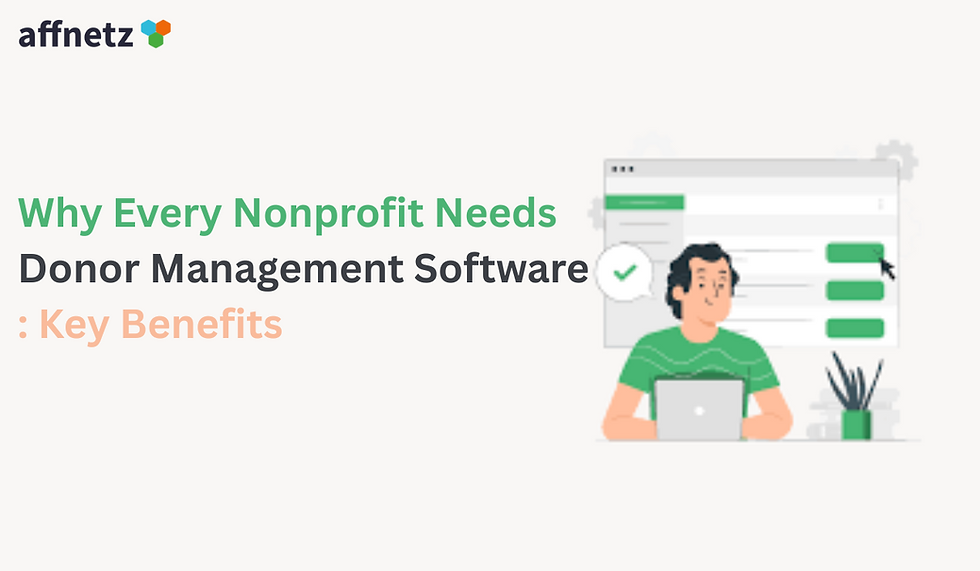Why Every Nonprofit Needs Donor Management Software: Key Benefits
- Affnetz seo
- 7 days ago
- 4 min read
For nonprofits, donor relationships are the lifeblood of any organization. Whether you’re a small charity or a large foundation, building and maintaining strong connections with your donors is crucial for long-term success. However, managing these relationships, keeping track of donations, and ensuring personalized communication can be a monumental task without the right tools. That’s where donor management software comes into play.

Donor management software is a specialized system that helps nonprofits efficiently manage donor data, track donations, and streamline communication. It simplifies administrative tasks and ensures that your team can focus on what matters most: making an impact. Below are the key benefits of using donor management software and why every nonprofit organization should consider implementing it.
1. Centralized Donor Database
One of the primary benefits of donor management software is the ability to maintain a centralized donor database. Instead of managing donor information across multiple spreadsheets, paper records, or scattered systems, this software consolidates everything into one secure platform. It enables you to store detailed donor profiles, including contact information, donation history, communication preferences, and more.
With all your donor data in one place, you can easily access, update, and analyze it whenever needed. This centralized system eliminates the risk of data duplication or errors and ensures that your team always has accurate and up-to-date information at their fingertips.
2. Streamlined Donation Tracking
Tracking donations manually can be time-consuming and error-prone. Donor management software automates this process, providing real-time tracking of all donations received, regardless of how they were made — whether through online giving, checks, or events.
Most donor management software comes with reporting features that allow you to view donation trends, track recurring donations, and identify major donors. This automated tracking makes it easier for nonprofits to generate reports for tax purposes, grant applications, and year-end summaries, saving valuable time and reducing the risk of human error.
3. Improved Donor Retention and Engagement
Retaining donors is often more cost-effective than acquiring new ones. Donor management software helps nonprofits enhance donor retention by providing tools to foster personalized communication. With features like automated thank-you emails, birthday greetings, or event invitations, you can keep your donors engaged and appreciated throughout the year.
Additionally, donor management software tracks donor engagement history, so you can tailor your communications to specific preferences. For instance, if a donor prefers updates via email over phone calls, the system can help you ensure that all future interactions align with their preferences. This personalized approach makes donors feel valued and more likely to support your cause over time.
4. Increased Efficiency Through Automation
Manual tasks like entering donation information, sending receipts, or updating donor records can eat up valuable staff time. Donor management software significantly reduces the amount of manual work required by automating many administrative processes. Automated workflows can handle tasks such as sending out donation receipts, following up with donors after an event, and even reminding donors to renew their commitments.
By automating these repetitive tasks, your staff can focus on more strategic efforts like donor cultivation and fundraising campaigns. This increase in operational efficiency ensures that your nonprofit runs smoothly, even if you’re working with a small team.
5. Enhanced Reporting and Analytics
One of the most powerful features of donor management software is its ability to generate real-time reports and analytics. With these tools, you can gain a deeper understanding of your donor base, track fundraising performance, and measure the impact of your campaigns.
For example, you can easily analyze which fundraising channels are most effective, assess donor giving patterns, and identify opportunities for further engagement. This data-driven approach allows your nonprofit to make informed decisions, optimize fundraising strategies, and ultimately raise more money to support your mission.
6. Better Event Management
Many nonprofits rely on fundraising events to engage their supporters and raise money. Donor management software can simplify event planning by allowing you to track ticket sales, RSVPs, and donations made during the event. Some systems even offer integration with event management tools, making it easy to manage everything in one place.
Additionally, donor management software allows you to segment your donor base to identify the best candidates for event invitations. You can easily create custom lists based on donation history, geographic location, or giving level, ensuring that your events attract the right audience.
7. Enhanced Security and Compliance
With increasing concerns about data privacy and security, nonprofits must take extra precautions to protect donor information. Donor management software ensures that sensitive donor data is stored securely and is accessible only to authorized personnel. Many systems also offer encryption and other advanced security features to protect against data breaches.
Furthermore, donor management software helps ensure that your organization remains compliant with legal requirements, such as data protection laws (GDPR, CCPA), and provides the necessary tools to manage tax receipts and donation acknowledgments. This peace of mind is crucial for maintaining donor trust and safeguarding your nonprofit’s reputation.
8. Scalability for Growth
As your nonprofit grows, your donor management needs will become more complex. Fortunately, donor management software is scalable, allowing you to upgrade and customize your system as needed. Whether you’re expanding your donor base, launching new fundraising campaigns, or managing multiple locations, the right software can grow with your organization.
Conclusion
Donor management software is a game-changer for nonprofits looking to streamline operations, improve donor relationships, and ultimately raise more funds for their causes. By centralizing donor data, automating administrative tasks, and providing powerful analytics, this software can help your nonprofit stay organized, efficient, and donor-centric.
.png)



Comments